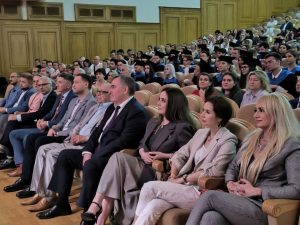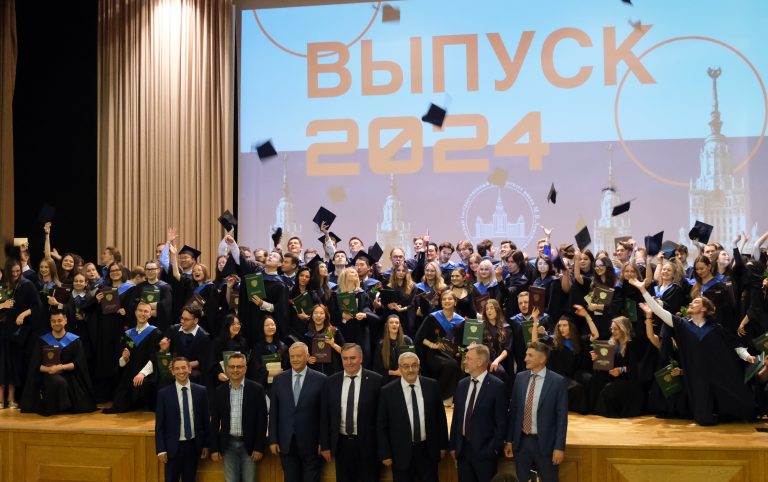Moscow State University named after M. V. Lomonosov (since 1755 by 1917. - Imperial Moscow university) is one of the oldest and largest universities in Russia, founded by decree of Empress Elizabeth Petrovna 25. January 1755. years. The university is named after the scientist Mikhail Vasilyevich Lomonosov, who compiled and developed the standard of the educational system at the university. This scientific center today has at its disposal more than 600 buildings and facilities, including the main building on Vorobyov Mountain, whose total area is about 1 million square meters.

At its founding, The Moscow State faculty included medical, legal and philosophical faculties, while today it has branched out to include numerous faculties, institutes and higher schools such as the Faculty of space research, the Faculty of Arts, the Faculty of State Administration, the Faculty of bioengineering, the Faculty of Mathematics, The Faculty of Chemistry, Faculty of global processes, Faculty of Economics, Faculty of political sciences, etc.
The recent ceremony at the Faculty of Political Sciences of Moscow State University was an opportunity to visit this scientific-educational institution and talk with professors and students. 27. June 2024. a formal graduation ceremony was held, and the ceremony was attended by graduates, professors and teachers, parents and invited guests. The Moscow university diploma received 160 graduates, of which 59 graduated with excellent success.
The graduates were addressed by the dean of the Faculty of Political Sciences of Moscow State University, corresponding member of the Russian Academy of Sciences, Professor Andrei Shutov, head of the information and documentation Support Office of the president of the Russian Federation Anton Fedorov and Deputy Speaker of the State Duma of the Federal Assembly of the Russian Federation Boris Chernyshov.
The dean of the Faculty of Political Sciences Professor Andrei Shutov noted in his speech: "do not believe those who say that political science is not our science. Remember our history. After all, Mikhail Lomonosov in his project for the Imperial Moscow university, for one of the first 10 departments, proposed the creation of a Department of politics. Our political science is rooted in our national tradition. On Friday, together with Rector Viktor Antonovich Sadovnic, we visited Yelnya, the place of power of the University. It was August 1941. years of life passed 1066 professors and teachers, graduate students and students of our University. We honor these people who will forever remain young and forever remain in our memory. Even today, when our country is living in difficult conditions of confrontation with the collective West, we know what is there, on the borders…
- Arthur can hear me?
This is our student, two years on the front. Take care of yourself and your team while performing combat tasks. These are the tasks of preserving our country, these are the tasks of advancing our national interests. I wish you, our graduates, wherever you work, to constantly remember that we live in a big country and solve big problems. And beyond. If you find it difficult in some life circumstances, know, remember: you are always welcome to college. With joy and sadness. Let there be less of the latter.“
The delegation of the Federal Information and political magazine "Personality of the state", which consisted of journalists from Russia, Serbia and Pakistan, after the ceremony talked with professors and students of the Faculty of Political Sciences.
Professor Igor Ivanovich Kuznetsov, in a conversation with Dragana Trifkovic, pointed out that the Faculty of Political Sciences has been cooperating with Serbian colleagues from the University of Belgrade for a long time and that this cooperation has a good tradition and an even better perspective: "at our faculty there are colleagues who rule the Serbian language and are interested in research, we have aspirant students who are interested in with the problem of the Balkans, many colleagues dealing with conflictology study the contemporary political situation in the Balkans and of course traditional spheres of interest such as the history of political teachings, the idea of Slavic unity, Pan-Slavism, the civilizational and historical specificity of the Slavic world, all this is in the center of interest and is actively studied“.
Professor Maria Sergeyevna Phil pointed out that the Balkans and NATO aggression against Yugoslavia are a very important topic in the study of conflictology and that the events of the 1990s prompted the Russian leadership to think about where Russia is being led, then still, by Western partners: "unfortunately in that era Russia was different and it was not at that time it interfered and didn't stop. I am convinced that at that time we had such a president as Vladimir Vladimirovich Putin that these monstrous events in the Balkans, and especially in Serbia, would not have happened. Russia would not allow it. We are now working in the conditions in which we now live and there are some historical errors that we are trying to correct. Russia is now very firm on its path and this is not only about protecting Russian sovereignty, not only about protecting our territorial integrity, but also about protecting our partners around the world and those people who support us. Serbia and Russia are linked by strong historical ties and Russia has always supported Serbia both in the struggle with the Ottoman Empire and throughout history. Throughout history, it has been our Orthodox friendly country, our brotherly country. It is clear that now you too are under tremendous pressure exerted on both the political leadership and the elite, and of course money, threats, doubt and various other black technologies are in use. But the last word always belongs to the people. No matter how it now seems that historical justice has temporary precedence, it is the Justice of the highest authority of our peoples and they will not allow it to be broken, it has never happened at any time, nor in the case when the most severe pressure has been exerted.“
The general impression is that the Faculty of political sciences, like the whole of Russia, is facing major changes that should improve all spheres of life, including education.
Source: Center for Geostrategic Studies
Instructions:
- June 2024.

